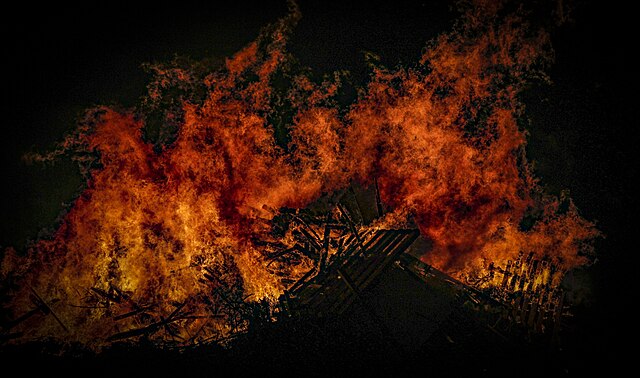
Bonfire Poets
The Hidden Tradition Of Fire-Lit Verse
When the crisp chill of autumn settles in the air, and the night skies begin to fill with plumes of smoke and the crackle of flames, it’s a sign that Bonfire Night is approaching in the UK. Most associate this annual event with the memory of Guy Fawkes and the failed Gunpowder Plot of 1605. But beneath the roaring fires and dazzling fireworks lies a lesser-known tradition that has quietly woven its way through British history: the voices of the “Bonfire Poets.”
The term “Bonfire Poets” doesn’t necessarily refer to a particular group of writers but instead captures a tradition of poetry that emerges each year around the blazing bonfires, where people have long gathered to share tales, recite verse, and celebrate the season. For centuries, this fire-lit poetry has captured the spirit of resistance, reflection, and community that Bonfire Night embodies. But who are the Bonfire Poets, and what does their work say about Britain’s historical and cultural identity?
Bonfires And British Identity
To understand the tradition of Bonfire Poets, it helps to understand the historical roots of Bonfire Night itself. After Guy Fawkes’ attempt to blow up the Houses of Parliament, bonfires became a way to celebrate his capture. But as years passed, these gatherings evolved beyond mere celebrations, becoming moments for communities to reflect on freedom, defiance, and the passing of time. Poetry often played a role, as people around the fire shared lines that spoke to the themes of freedom and justice.
Much of early bonfire poetry would have been oral, rooted in folklore and song. Villagers would gather to recite verses that expressed the spirit of the night. Over time, poets started publishing verses specifically for Bonfire Night, mixing fiery imagery with messages about the resilience of the human spirit. The language of these poems often used flame and shadow as metaphors for hope, rebellion, and the constant tension between darkness and light.
Bonfire Poets Through The Ages
In the 19th century, Bonfire Poets gained renewed popularity, as the Victorian era saw a resurgence of interest in folklore and tradition. Writers such as Thomas Hardy would use autumn and winter scenes as backdrops to explore themes of human struggle and resilience. Although Hardy may not have explicitly written about Bonfire Night, his imagery of fires, gatherings, and the natural world resonates with the atmosphere of the night.
Similarly, poet and painter William Blake often drew on themes of fire and resistance, though his work predated the Victorian era. Blake’s vision of fiery redemption and divine inspiration made his work a natural fit for the spirit of Bonfire Night, and his influence can still be felt in the words of poets who capture the eerie magic of flames.
In more recent times, poets such as Ted Hughes have touched upon fire and wilderness with intensity, capturing nature’s raw power and its psychological impact. Hughes’ work, though not strictly associated with Bonfire Night, carries a haunting reverence for the elemental, which resonates with the experience of gathering around a roaring bonfire.
Themes Of Bonfire Poetry: Fire, Freedom, And Folklore
Bonfire poetry isn’t all historical reflection or political sentiment. Many poets celebrate the community spirit of the night—the laughter, the food, and the sheer spectacle. There’s a sense of enchantment in these gatherings, as firelight transforms the ordinary into the magical, creating a liminal space where stories and myths come to life. Common themes in bonfire poetry include:
– Fire as Renewal: Flames in the poetry often symbolise a kind of cleansing or transformation. The fire becomes a metaphor for personal growth, or for the death of old ideas and the birth of new ones.
– Rebellion and Defiance: Given the history of the night, Bonfire Poets frequently touch on themes of resistance and revolution. The night becomes a reminder of the fragility of freedom and the power of collective spirit.
– Nostalgia and Community: Many poems dwell on the sense of togetherness that bonfires inspire. The warmth of the fire becomes a symbol for human connection, often prompting reflections on the past and a longing for simpler times.
– Mysticism and the Supernatural: As flames flicker and shadows dance, poets often tap into the otherworldly side of Bonfire Night, drawing on myths, fairytales and folklore to give their verse an ethereal quality.
Contemporary Bonfire Poetry: Carrying The Flame Forward
Today, these poets may be found across Britain, reading or writing verse for Bonfire Night gatherings. In towns where traditions are kept alive, you may even find local poets reciting by the fireside, while others take to social media, sharing their words with digital communities who celebrate Bonfire Night from afar.
Some contemporary poets have used Bonfire Night as a platform to discuss modern political issues, echoing the tradition of resistance and freedom that dates back centuries. Others focus on the night as a celebration of warmth and community, a time to appreciate the beauty of gathering together as the seasons turn colder.
As Bonfire Night evolves, so too does its poetry. From verses passed down through generations to modern reflections on community and connection, Bonfire Poets keep the tradition alive, capturing the flickering spirit of Britain’s most fiery celebration. Whether on paper or around the fire, their words remind us of the enduring magic of flame, verse, and human connection.
So this Bonfire Night, as you stand beside the fire, take a moment to think of the words that might be rising with the smoke. In that moment, you, too, might become a Bonfire Poet, part of an old yet enduring tradition of capturing the heart of the night in verse.
If you are interested in studying English or English Literature, Oxford Open Learning offer the chance to do so at several levels. You can also Contact Us.
